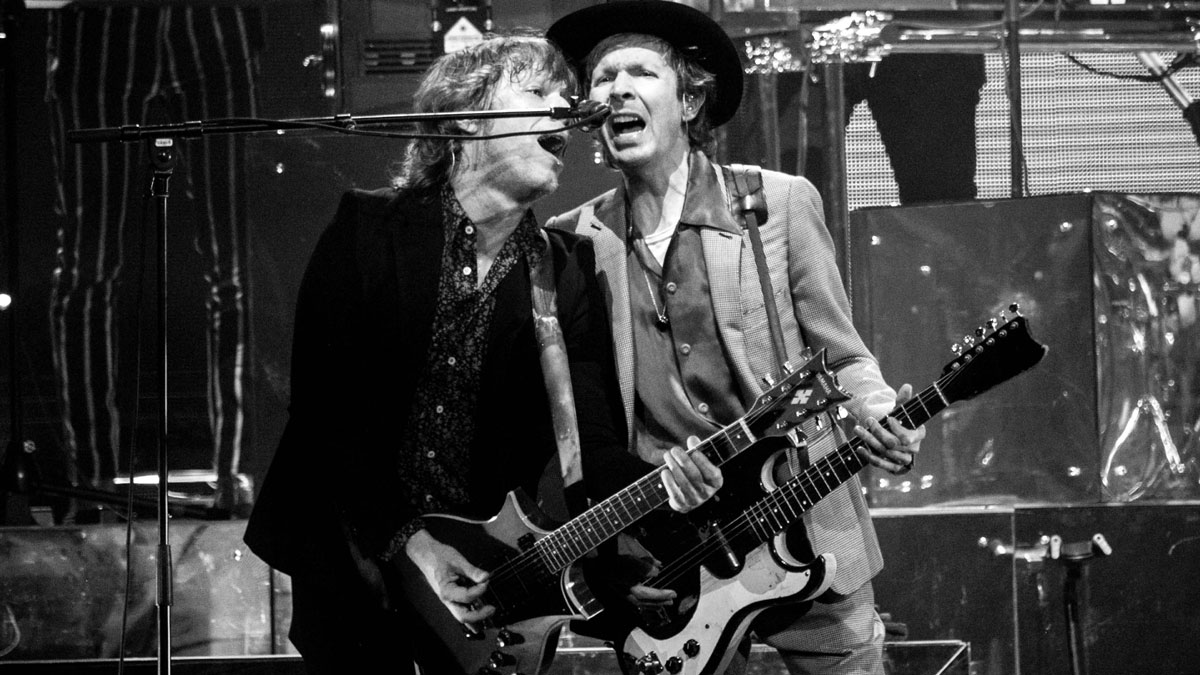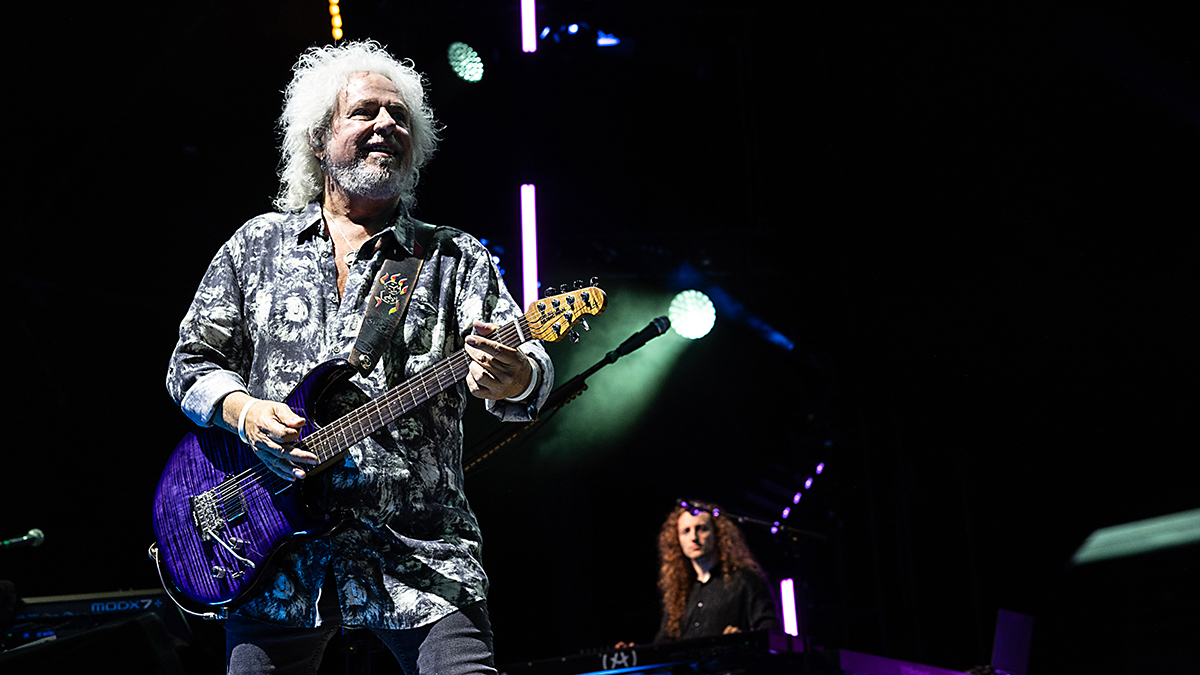“I was sitting around my house, drinking too many margaritas because I thought the world was ending. I got a call asking if I’d be interested in playing with St. Vincent”: Jason Falkner’s “oddball” guitars took him from Jellyfish to Beck and St. Vincent
The journeyman guitarist and session pro developed a bass technique without owning one (landing him a gig with Noel Gallagher), discovered St. Vincent isn’t the musical dictator he’d expected, and knows his fans are impatient for his next solo album

From his early gigs with The Three O'Clock, Jellyfish and The Grays, Jason Falkner learned quickly that the music business is filled with left turns.
Thankfully, Falkner – who recorded the indie classic Bellybutton with Jellyfish in 1990 – has long had songwriting chops and accompanying licks for days, leading to five solo records, numerous studio works with Air, Noel Gallagher, Daniel Johnston and Cheap Trick, and mega gigs with Beck and St. Vincent.
Whether playing bass or guitar, he keeps things fresh, quirky and highly textural. That keeps him in demand, no matter the genre or the gig. Lately, when he’s not on the road with Beck and St. Vincent, he’s pondering his long-awaited sixth solo record, which he admits has taken “an embarrassingly long time”.
What sorts of sounds were you attracted to as a young guitarist?
“I was a classical piano kid starting at six years old, and then I got into FM radio stuff, like Led Zeppelin, Boston and Queen. I remember thinking my guitar sounded distorted when I first plugged it in – I felt it would sound like Tom Scholz!
“My parents had avoided getting me a guitar, but they finally relented and got me an early ‘70s Fender Mustang when I was 13 and new wave was kicking off. New wave, punk and classic rock were all things that came from different schools but were always present in my brain then.”
You joined The Three O’Clock and then Jellyfish not long after. What was your rig like around then?
All the latest guitar news, interviews, lessons, reviews, deals and more, direct to your inbox!
“In The Three O'Clock, I had one guitar – the Fender Mustang from my parents. A bit later I also had a John Lennon Rickenbacker [1958 325] and I used both in that band. As for amps, I only had a little Gibson one my parents gave me, which was a 12-watt that got lost. I often borrowed amps from friends.
“But in Jellyfish, I became more sophisticated with gear and I got obsessed with Vox AC30s. Jellyfish producer Albhy Galuten had a gear hookup with vintage shops in LA, and we’d rent all this Holy Grail stuff. I had five AC30s to choose from, and we’d jog back and forth depending on the song.”
No more Mustang by then?
“We had all these amazing guitars, and the producer noticed me fooling around with my Mustang, which had lost the whammy bar. I developed a technique where I’d strike a chord and push down on the tube sticking out from the bridge where the whammy bar went – I’d push that forward and jog back and forth. That was my vibrato.
“It sounded so fucking cool, and the producer said, ‘You’ve created your own thing. That’s your guitar.’ And it was no joke – it was original, so I used the Mustang mainly.”
Gear aside, what memories do you have of putting together Jellyfish’s Bellybutton?
“We did the demos in San Francisco in the summer and plowed through them. They had written many of the songs, and I remember liking them a lot. I certainly thought I’d eventually be able to write more, which was false hope.
“I felt like I could flex my classic rock inclinations more, which was cool because previous bands had been more psychedelic and bubblegum stuff. I was excited by the idea of getting a little heavier.”
It didn’t work out with Jellyfish – but do you look back on the record fondly?
“I still love how sparse that record is. While tracking as a live trio, I got most of my guitar sounds down in one of the booths with an AC30. If you listen, my rhythm parts disappear whenever I play a solo because it’s the same take, which was a classic way to make a record.
“Since then I’ve become all about multiple overdubs and having a wall of guitars, so that was a different kind of experience.”
I’ve got tons of weird guitars. There’s no reason you’ve never heard of them, like they suck. They’re all great guitars
How did your gear evolve once you started your solo and session career?
“I’ve always just recorded whatever I felt the song needed until it was done. I’m a big fan of the art of reduction, where you pull things instead of adding. But I’m so in love with the electric guitar; that thing, to me, is a living, breathing thing.
“I have a crazy collection of oddball guitars. All of them are extremely playable – I never keep anything junky. People will come say, ‘What the hell is that?’ And then they pick it up and say, ‘Holy shit, it plays just like a Les Paul.’ And I say, ‘That’s why I have it!’”
Which of those guitars do you most often turn to?
“A ’61 Fender Jazzmaster, which is Fiesta Red with a matching headstock. I’ve been playing that on stage a lot with St. Vincent lately. Another is a first-year [1981] Hammer Prototype; it’s such a cool guitar. I got into that from James Honeyman-Scott; it's just like his.
“I loved seeing him with it because it didn't look like some stupid heavy metal guitar or nonsense like that. Nick Lowe also played one, which is probably how James Honeyman-Scott got into it, as Nick was involved with the first Pretenders record.
“I also have a couple of Framus guitars from the ‘60s and some ‘60s Hagstroms, too. Some of them are very rare, like my Retroscape Impala, one of my favorite guitars. And then I have some early ‘70s Guilds called Aristocrats; they look like a Les Paul.
“I have stuff by Gretsch and Dean, with the giant V headstock and others. I’ve got tons of weird guitars. There’s no reason you’ve never heard of them, like they suck. They’re all great guitars.”

You’ve been with Beck for a long time. How did that happen?
“We met in the mid to late ‘90s. He used to come to my shows, but he was already very successful. Around that time, we became pals, and he’d say, ‘Hey, man, we should really do something together.’ He didn't just want to collaborate – he wanted me to be in his band, which eventually happened.”
Your first record with Beck was Sea Change. Was that that like?
I didn’t have a bass for the longest time. I would just tune my guitar way down to where the strings were super-loose. By doing that, I created this style of playing
“The guy is just so creative. He’s a real trailblazing musician and writer. We bonded early over a lot of obscure things that are generational for us. We both love weirdo, outsider stuff, and hip-hop, which led to having no set way to approach things. I learned early on that he doesn’t nitpick, and it was and is a very easy musical friendship.
“He invited me to the studio for the Sea Change sessions. The first thing I did was grab my ’73 Fender Telecaster Custom and play this little wiry guitar thing that ended up on Paper Tiger.
“I found out the string part on that was done around the guitar lines I’d recorded. If you listen, you can hear the strings follow this spidery lead thing I did, which I took as a huge compliment.”
You appeared on Noel Gallagher’s Who Built the Moon? and Council Skies.
“I only play bass on those records. I also played bass on the last few Primal Scream records. The whole bass thing is interesting because I didn’t have a bass for the longest time. I would just tune my guitar way down to where the strings were super-loose!
“By doing that, I created this style of playing, and once I got a real bass, I kept doing all these palm mutes where I was playing with a pick, but I was resting my hand before the bridge. I’m not the first to do that, but I figured it out on my own and combined it with an Ampeg amp with just a single 18-inch speaker and a Fender Mustang bass.
“I get a nice, throaty, low-mid quality of that bass since it's short-scale and has pickups positioned between the neck and the bridge. That bass, combined with the massive bottom end of the speaker, is like my favorite thing in the world – that’s the combo I use with everything I play bass on.”
What’s playing with St. Vincent been like?
“Oh, she’s phenomenal. She’s an amazing guitarist and songwriter. I absolutely adore her. The thing with her happened during the lockdown in 2021, when I was just sitting around my house, recording songs, and drinking too many margaritas because I thought the world was ending.
Playing with St. Vincent is one of the most thrilling things I’ve ever done. She’ll hear me play things and ask, ‘What’s that? It’s so cool’
“I got a call asking if I’d be interested. The first thing we did was Saturday Night Live, and then, when things loosened up, I went on tour with her for a couple of years.”
Balancing that with your duties with Beck and your solo career must be challenging.
“Playing with St. Vincent is one of the most thrilling things I’ve ever done. I assumed she would be more of a dictator musically but was pleasantly surprised to find out otherwise. She’ll hear me play things and ask, ‘What’s that? It’s so cool – how did you do that?’
“I can add things to her songs that may not be on the record, and she’ll like them and say, ‘Hey, can you teach me that?’ It’s been a truly rewarding experience, and I’m hoping to tour with her and Beck this year. I don’t think I’ll be able to do everything with her once Beck ramps up again, but I’ll be able to do some.”
Do you plan to release another solo record soon?
“I’m trying to figure out the best way to put it out. It’s been too long and I’m thankful to my fans for being patient. They’re very vocal – in a good way – about being disappointed that it’s taking so long, which I appreciate.
“If I'm being honest, I am most excited about finally getting my solo record and doing some touring to support that, which I expect to happen this year. So it’s gonna be pretty busy.”
- Follow Jason Falkner on Instagram.
Andrew Daly is an iced-coffee-addicted, oddball Telecaster-playing, alfredo pasta-loving journalist from Long Island, NY, who, in addition to being a contributing writer for Guitar World, scribes for Bass Player, Guitar Player, Guitarist, and MusicRadar. Andrew has interviewed favorites like Ace Frehley, Johnny Marr, Vito Bratta, Bruce Kulick, Joe Perry, Brad Whitford, Tom Morello, Rich Robinson, and Paul Stanley, while his all-time favorite (rhythm player), Keith Richards, continues to elude him.

